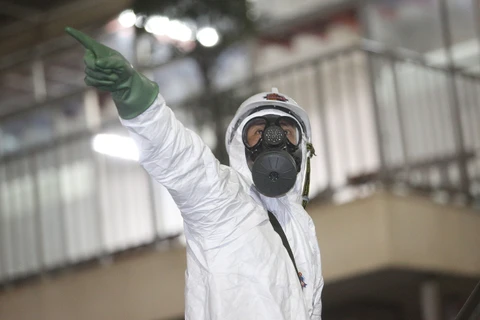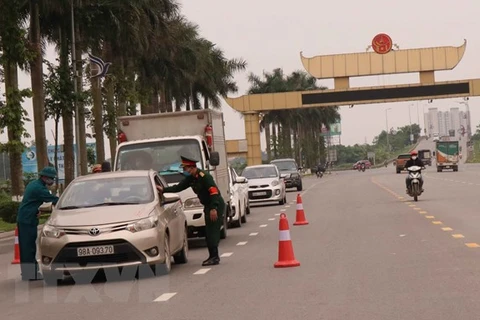 A Co.opmart in HCM City continues its safety measures to meet the city's requirements for Covid-19 prevention and control. (VNA file photo)
A Co.opmart in HCM City continues its safety measures to meet the city's requirements for Covid-19 prevention and control. (VNA file photo) HCM City (VNS/VNA) - Supermarkets, shopping centres and traditional and wholesale markets in Ho Chi Minh City have assessed their COVID-19 infection risks through a set of evaluation indicators and have set safety measures to meet the city’s requirements.
The city’s Steering Committee for COVID-19 Prevention and Control launched the assessment tool as part of a programme to help local businesses reopen.
The city’s Department of Industry and Trade provided assessment guidance to people's committees in all 24 districts and to management boards at wholesale markets, traditional markets, supermarkets and trading centres.
The department also worked with the Department of Information and Communications to inform residents about shopping places that meet the requirements for reopening.
So far, three wholesale markets, 216 supermarkets and 40 trading centres have sent their self-assessment reports to the department.
The People's Committees in 24 districts have reported that 196 out of 197 traditional markets have met the safety requirements. Dinh Market in Hoc Mon district is taking measures to overcome its shortcomings.
From April 28 to May 7, the Department of Industry and Trade in collaboration with the People's Committees in 24 districts checked 17 places to ensure they were applying safety measures. Most of the places met 80 percent of the requirements for operation.
More than 85 percent of enterprises in the city have been affected by the pandemic, including 87 percent of businesses in the retail sector, according to the city’s Statistics Office.
In the first five months of the year, total retail sales of consumer goods and services have been estimated at 506 trillion VND (21.7 billion USD), a decrease of 4.9 percent compared to the same period last year.
Of the figure, retail sales of goods in the first five months has been estimated at 331 trillion VND (13.4 billion USD), a year-on-year increase of 8.4 percent, accounting for 65 percent of total retail sales of consumer goods and services.
Retail sales of goods are recovering, but are still slow because purchasing power and rental demand have been affected.
Purchasing power increased by 10-15 percent after the social distancing order was relaxed, with a higher increase at retail channels such as supermarkets, hypermarkets and convenience stores.
In the second quarter, retail and distribution systems have launched promotion campaigns to promote purchases through mobile phones, websites and apps, and have offered attractive delivery policies.
The shift from traditional offline channels to online sales has helped businesses improve revenue./.
VNA























